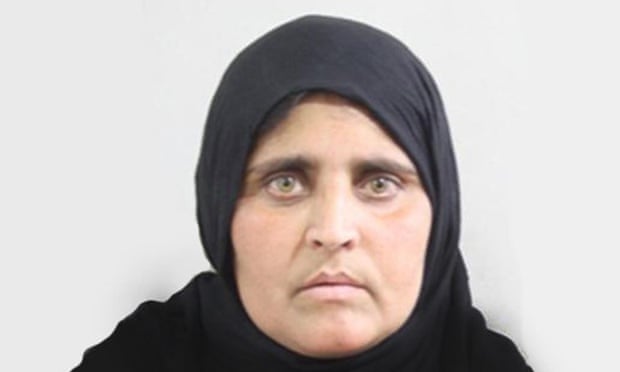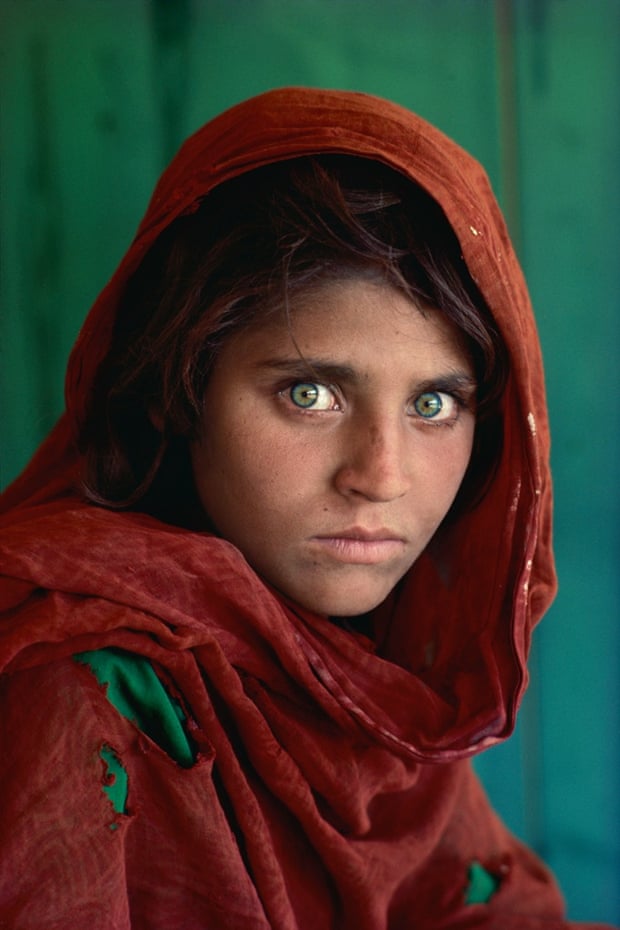Afghan refugee on 1984 National Geographic cover embroiled in ID row
Three decades after she became an icon, an ID card mugshot of Sharbat
Gula has become a symbol of Pakistani hostility towards refugees from
Afghanistan

In 1984 a photo of a green-eyed girl staring out of the front cover of National Geographic became an icon of the plight of Afghan refugees forced by war into Pakistani refugee camps.
Three decades on and a new picture of Sharbat Gula, this time a cheap mugshot of a middle-aged woman, has come to symbolise the hostility many Pakistanis feel towards people they believe have outstayed their welcome.
On Tuesday the national media published the photograph from Gula’s computerised national identity card (CNIC), a vital document that she should not have been able to acquire as a foreign national.
That one of the most famous of the nearly 3 million Afghan refugees living in Pakistan should have been able to get the card underlined for many the corruption that riddles much of government.
Afghans can only buy property, open a bank account and be confident they will be able to remain indefinitely in a country that wants rid of its refugee population by having a CNIC, usually acquired with fake documents and bribes.
Faik Ali Chachar, a spokesman for the national database and registration authority (NADRA), said Gula’s card had been detected and blocked in August and that four officials had been suspended for their suspected involvement.
He said the agency has so far found more than 22,000 cards illegally held by Afghans.

Afghans first began moving to Pakistan following the Soviet invasion of their country in 1979, and generations have grown up without ever having visited their ancestral homeland.
The refugee population continued to grow after the withdrawal of Russian troops in 1989 as Afghanistan descended into civil war.
Millions of Afghans have returned to their homeland since the international community uprooted the Taliban regime in 2001, but more than 2.5 million are thought to remain – the second largest refugee population in the world.
They have long been unpopular, with many Pakistanis blaming them for crime and terrorism.
“We need them to leave Pakistan because we are badly suffering,” said Hamid-ul-Haq, an MP who represents Peshawar, the north-western city where many Afghans are settled. “All our streets, mosques, schools are overloaded because of them. It is time for them to leave Pakistan honourably.”
There have been several half-hearted attempts to force more of them to quit the country, including a threat to cancel their refugee status, but official deadlines have repeatedly been ignored or allowed to slip.
The government has also attempted to clear slums in Islamabad that are populated by Afghans.
Action against Afghan refugees has intensified following last December’s attack by the Pakistani Taliban on the army public school in Peshawar, in which more than 130 schoolboys were killed.
In the month after the attack more than 33,000 undocumented Afghans flocked across the border according to the International Organisation for Migration – double the figure for the whole of 2014.
Those arriving in Afghanistan have claimed to have been beaten by police, arrested and evicted from their houses.
Human Rights Watch (HRW) this week called on Pakistan to stop trying to coerce refugees to return.
“Pakistan’s government is tarnishing the country’s well-deserved reputation for hospitality toward refugees by tolerating the punitive and potentially unlawful coercive repatriation of Afghan refugees,” said HRW’s deputy Asia director, Phelim Kine.
Gulzar Khan, a politician and former commissioner for Afghan refugees, said Pakistan could not expect such a large number of people to leave overnight.
“The current Afghan government is in a very vulnerable situation both economically and politically. If roughly two millions refugees are pushed back the Afghan government will have a major crisis on its hands,” he said.

No comments:
Post a Comment